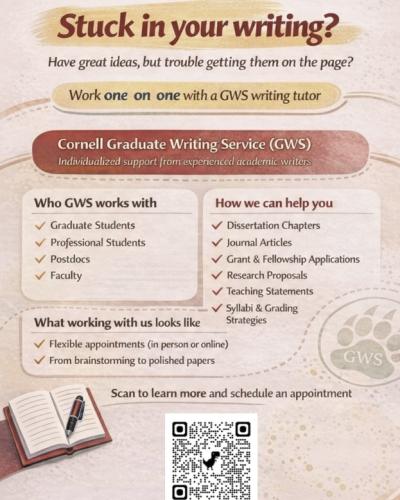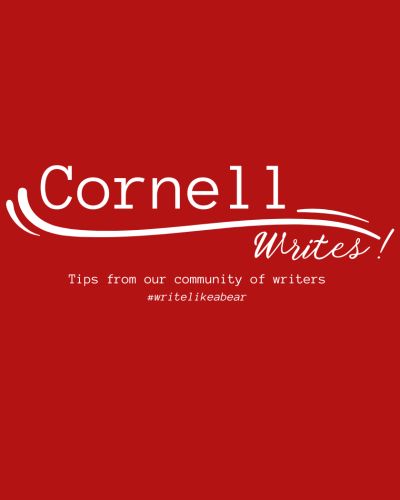Cornell Writes! Tips from our community of writers is a digital newsletter sponsored by the Knight Institute for Writing in the Disciplines and the Cornell University Graduate School.
Each week, a member of our writing community – a Graduate Writing Service, English Language Support Office, or Cornell Writing Centers tutor; a writing specialist from the Knight Institute; a writing instructor from our First-Year Writing Seminars or Writing in the Majors programs; maybe YOU – will share a writing strategy from their own writer’s toolkit. #writelikeabear
Contact Tracy Hamler Carrick with questions and ideas.
Meet Kelly Richmond
Hello Cornell Writers! My name is Kelly Richmond. I am a PhD Candidate in the Department of Performing and Media Arts, a tutor at the Graduate Writing Service, and I have taught five semesters of FWSs.
Here is this week’s Writing Tip!
Today's writing tip is about my favourite part of the writing process: invention. If you don't already think about your writing practice as a writing process, I recommend taking 9 minutes to watch this Study Hall Composition video.
Sometimes we call invention "prewriting", the creative work we do before we sit down to do the organizational work of planning (see the previous CWS tips for some great planning strategies!) or the "actual" work of drafting. However, I think this "prewriting" step limits us from realizing that most of the time we need to write down some words before we can move onto the planning stage. It also can allow us to procrastinate, putting off the dreaded step of opening microsoft word because we are "prewriting" while procrasta-cleaning the kitchen.
Freewriting is the most common form of invention work. The basic idea is to pick a prompt, set a timer (start small, say 10 minutes), and JUST KEEP WRITING. If you get stuck, you can write HELP IM STUCK HELP IM STUCK until you get unstuck. You don't need to worry about punctuation or typos, the idea of the freewrite is not to create content that will go in your draft, but to realize what you even think about your topic in the first place, including what questions you have, and therefore what further research might be needed. Free yourself from the idea that your professor or editor will ever read this content, and take some time to understand your own thoughts.
No matter where I am in my writing process, I start every work session with a freewrite. I open a new document (learn to love that blank page so it has no power over you!), and put the date and a prompt at the top. My prompt might be:
- a quotation I want to respond to
- a key term I know I still need to define
- a question that's really bothering me
Sometimes if I'm really stuck, I address my freewrite as a letter to a close friend who I know knows nothing about the topic (Dear Alex, Today I am writing to you to explain Judith Butler's theory of gender performativity). I generally do my freewriting on the computer, but if I feel so stuck the letter writing won't do it, then I move my Invention work to the pen and paper.
Some days, freewriting is just a warm up. I'll save the document when the timer goes off, and I'll never look at it again. But now I'll be in the headspace to get into the work of outlining my argument, close reading a key text, revising my draft, or editing my citations. Other days, the freewrite flows right into those tasks, and I'll keep working with the document past the timer. Either way, I love the satisfaction of having gotten new words onto the page each day.
Most of my students love freewriting. It's a moment in the day of complete creative freedom, and tends to be intrinsically motivating. The hardest part is just getting in the habit, remembering to make it a part of the daily routine. But some students feel like it's a waste of time, because they want to only write the words that "count."
But here's the secret of invention work: generally, my "first draft" of an essay will be a collection of my freewrites, organized according to the logic of my outline. It won't be a polished piece of writing I would share with an external reader BECAUSE IT WILL LOOK LIKE THIS (FIND EXAMPLE SOURCE?) "QUOTE FROM THE PROFESSOR IS IN ON TIME MANAGEMENT," but it will include all my key ideas. Of course this also means that it takes me many days to get the first draft done, because I'm only doing one freewrite a day. I'll generally try to do at least 5 days of freewriting before turning to the outline phase (at which point I can brainstorm a list for my future freewriting prompts). By returning again and again to the Invention process, I've done basically all the labour of crafting a draft, with none of the emotional effort.
I love the Invention stage of the writing process because it allows for uninhibited creativity, where I don't have to worry about argumentation, flow, or formatting. I can be playful and weird, or boring and robotic, the point is just to get words out of my body and onto the page. By putting more time into Invention than Drafting, I allow writing to be a habit I genuinely enjoy.






